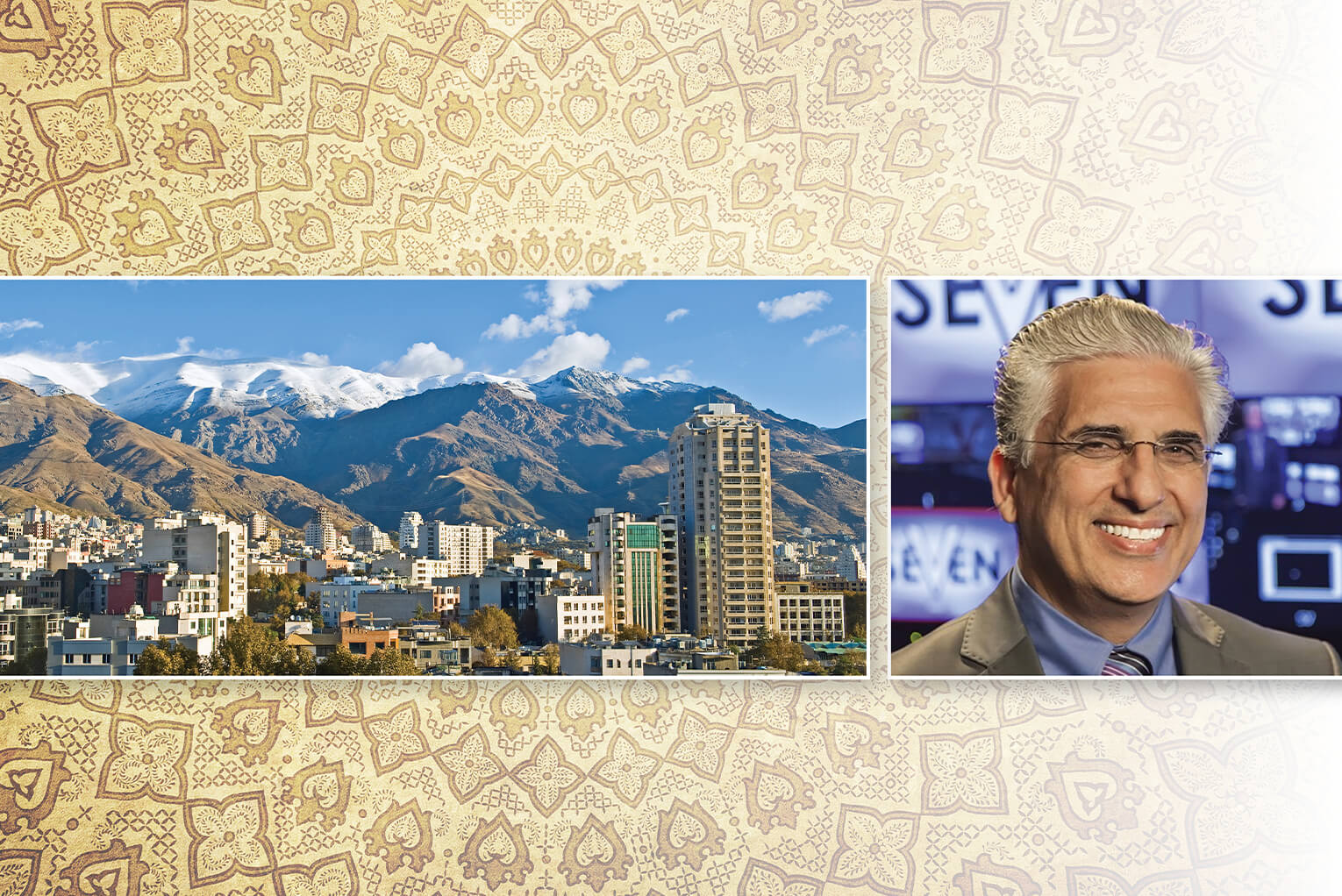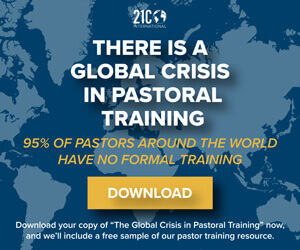Not long after the Iran hostage crisis, the authorities arrested Hormoz Shariat’s 16-year-old brother, Hamraz, on a minor political charge. At the time, Hormoz was a new believer in America and was confident his brother, a political activist who had a small role with the Mujahedeen, would be released. But in 1984, after two years in jail, Shariat’s brother was executed by a firing squad.
Shocked by the news of his brother’s death, Shariat broke down crying, asking God why He let it happen. He felt anger toward God and the people who killed his brother. A few days later, Shariat told God he wanted revenge—but then he recalled the Bible’s words that say, “Vengeance is Mine” (Deut. 32:35; Rom. 12:19). Shariat told God he hated those who had killed his brother—but then he remembered Jesus said anyone who is angry with their brother has already murdered them in their heart (Matt. 5:21-22).
He says he felt the Lord saying to him in prayer, “You know who your enemy is? These people—the clergy and the leaders of Iran—are not your enemy. They are lost children. You have only one enemy. Satan has been working to bring about this injustice. If you want to hurt Satan, evangelize. It hurts him really bad when you bring people to Christ.”
As Shariat tells it, that’s when he committed himself to sharing the gospel the rest of his life.
“I had a vision that by the end of my life I could bring 1 million Muslims to know Him,” he says. “I also learned that God’s love is the greatest power we have to stop Islam and help Muslim captives be free.”
Visions of Jesus
In the three decades since Shariat set his resolve, this minister—dubbed “the Billy Graham of Iran” by New York Times best-selling author Joel C. Rosenberg—has not only watched that goal come to fruition, but has also been given a front-row seat to one of the most astonishing supernatural phenomenon in modern times: thousands of people in Iran and throughout the Middle East reporting visitations of Jesus in dreams and visions.
“It’s amazing,” says Shariat, who founded the satellite broadcasting ministry Iran Alive Ministries in 2001. “God is graciously appearing to people in visions, dreams and through miracles. Sometimes they have dreams or visions of Jesus, run across our satellite television broadcast, hear the gospel, and then they believe. They may have, as children, had dreams or saw visions of Jesus. The vision or dream prepares them for the gospel. Other times they watch our program, ask if this is true or not, and then they have a dream or vision that confirms what they heard.”
Shariat believes the message is clear—that God is telling Christians in the West, “You look at them as terrorists who have no hope of salvation. Are you looking at them that way? I’m not. Look at Me. I’m appearing to them. I’m doing it Myself. Would you join Me to reach out to the Muslims?”
Rosenberg wrote about this phenomenon of dreams and visions in his book Inside the Revolution. “It’s an exciting development,” he says, “and it’s consistent with the Bible prophecies found in Joel 2, in which the Lord says in the last days He will pour our His Holy Spirit and people will see dreams and visions.”
Explosion of Faith
Since the hostage crisis ended in 1981, Rosenberg says the number of Christians in Iran has increased exponentially, from 500 to a conservative estimate of 1 million. Shariat, however, says the number may be far larger, noting that Iran—the world’s only theocracy, with 76 million residents—has the fastest-growing evangelical Christian population on the planet, according to the latest edition of Operation World’s manual. In fact, more Persians have come to Christ in the 35 years since the Islamic Revolution than in the prior 1,400 years combined—and most of these conversions have occurred in the past decade, as an estimated 62 million Iranians have gained access to the gospel message through satellite TV broadcasts.
“Some people put the number [of Christians in Iran] at 3 to 5 million,” says Shariat, who launched Network 7, Iran Alive’s 24/7 satellite broadcast network, into Iran, the Middle East, Northern Africa and Europe in January 2012. Shariat says it is hard to estimate how many have come to Christ through his broadcast because the phones are controlled and it is dangerous and expensive for Iranians to call the ministry.
“Nevertheless,” he says, “over the last 12 years of broadcasting, we have the names of over 27,000 people who have called us to pray to receive Christ or to indicate that they have done so through our broadcasts. Probably 10 times that many have made the same decision but did not dare to call us.”
The program has more than 100 million potential viewers, and Shariat estimates that at any given time, 3 to 6 million people are watching.
Hungry for Christianity
The remarkable growth of Christianity in a nation whose Islamic leaders are believed to be developing nuclear weapons and have called for the annihilation of Israel and America—labeling the U.S. as the “Great Satan” and Israel as the “Little Satan”—is certainly one of the most surprising developments in the Middle East in recent years.
While many factors play into what Rosenberg describes as a “historic spiritual awakening” in Iran, faith leaders say Shariat’s satellite broadcasts have played a key role. Rosenberg says, “Satellite television has been a game-changer in Iran, and Hormoz [Shariat] is at the forefront of that.”
“I see him operating in his anointing, and God is using him,” agrees Kamil Navai, pastor of the Iranian Christian Church in Sunnyvale, Calif., a church Shariat co-founded with Navai and pastored for many years. “It’s like David, with only one stone and a sling and taking on the giant of Islam.”
David Cannistraci, pastor of GateWay City Church in San Jose, Calif., and a longtime friend of Shariat, says people in Iran are “very hungry for the faith” and that Shariat is the “single greatest hope for his nation in our day.”
“As Hormoz has explained it to me,” Cannistraci says, “people tend to think of Iranians through the filter of national news—crazy people in the streets calling for the death of America. But Hormoz points out that Islam is not Iran’s original religion. Christianity pre-dated Islam in Iran, and the heart of the Iranian people is longing for freedom.”
In fact, Islam didn’t come into existence until the seventh century.
“Prior to that time, the gospel had made inroads into Iran,” Cannistraci says. “They were invaded by the Muslims and forced at the point of a sword to take on Islam. Today they are very hungry for Christianity, and this is what explains the pent-up demand and hunger for Christian programming.
“So Hormoz has just stepped into an environment that is a spiritual vacuum. He’s a man at the right place at the right time for such a time as this.”
Simplicity of Faith
Shariat was born Sept. 9, 1955, into a Muslim family in Tehran, Iran. He grew up as a fairly devout Muslim but began to question his Islamic faith as a teen.
“I started thinking, ‘What is this religion I’m following? I’m repeating these prayers, but it’s not adding anything to my life. I’m not changed. I don’t have peace. I don’t have joy. I don’t even experience the presence of God,’” he recalls. “So I stopped doing it, and I focused on my studies and being a good person.”
Shariat, along with his wife, Donnell, came to the U.S. following the Islamic Revolution in 1979 to earn his Ph.D. in computer engineering at the University of Southern California. The revolution reawakened his spiritual yearnings, and he began to read the Bible.
“I was struggling with every verse,” Shariat says. “Who is this Jesus? At the time, my theory was that all religions were the same. But the more I studied the Quran and the Bible, the more I realized that both could not be true. They are so contradictory.”
After struggling for a while with this dilemma, Shariat began attending the Church of the Open Door in downtown Los Angeles in 1980, famous for its huge “Jesus Saves” sign on the building.
“I went there to get my answers,” Shariat says. “After a few weeks, I realized the message was simple: You believe the simple truth that you’re a sinner and that God loves you. I read the Sermon on the Mount and learned that we’re all sinners. The basic message of the gospel was very logical to me. I came to the point where I said I was going to try it. I said, ‘Jesus, come into my heart and my life.’”
Satellite of Hope
After obtaining his Ph.D. in 1987, Shariat obtained employment in San Jose doing artificial intelligence research. He and his wife also felt led to start a house church, which began with just a few people but quickly grew to include hundreds of Muslim converts and now remains one of the largest churches of its kind in the U.S.
After planting more churches among Iranian Muslims in Northern California, Shariat founded Iran Alive Ministries in 2001. Shortly after the Sept. 11, 2001, terrorist attacks, Shariat’s first satellite broadcast program aired in Iran.
“From day one, the response was amazing,” he says. “We were getting hundreds of phone calls. TV is a lifeline for Iranians. Christian television is not entertainment. This is their only source of hope.”
Although satellite dishes are illegal in Iran, Shariat reports that more than 80 percent of Iranians have access to satellite television broadcasts.
“A friend of mine came back from Iran recently and showed me pictures of Bedouin tents with satellite dishes,” he says. “They don’t have running water, but they have a satellite dish with a generator. [It’s] their only connection to the outside world.”
In 2003, Shariat’s ministry became involved in planting underground churches in Iran. In recent years, hundreds of house church leaders have been arrested, including American pastor Saeed Abedini, who’s married to Shariat’s niece, Naghmeh. Abedini, whose plight has gained international media attention, remains imprisoned in Iran’s deadliest prison.
Shariat says that after several decades under the current regime, many Iranians are concluding Islam is not the answer. They see the regime as a problem and the reason for their miserable lives, and they’re turning to Christianity despite severe government persecution.
“I’ve seen a new movement and a new mindset developing among Iranians, especially young people,” he says. “I read more and more young people’s blogs that are saying, ‘If we want to have a future, we need to get rid of Islam.’ I believe Islam is experiencing its greatest defeat in history. It’s so wide and deep that it’s irreversible.”
Battle for Souls
This is where the connections to America’s most beloved evangelist come in. Rosenberg says the impact Shariat is having on the Persian-speaking world is “evocative of how God used Billy Graham for much of the 20th century.”
“The difference, of course, is that Billy Graham used stadiums as well as broadcast television and radio to preach the gospel, and Hormoz Shariat doesn’t have access to stadiums in Iran,” Rosenberg continues. “But through the miracle of global satellite television technology, he is able to broadcast the gospel in Farsi into Iranian homes in a way that allows him to bypass the Iranian government and Islamic religious system. That is an extraordinary development in the last decade and has really opened the doors for the gospel in unprecedented ways in such a closed country as Iran.”
At this time, a cosmic, supernatural battle is underway for the souls of the Iranian people, Rosenberg says. Christ will win, but Satan is fighting very hard.
“That’s my perception of what’s happening,” Rosenberg says, “and so what you have inside Iran is a conundrum. Iran’s leadership is arguably the most evil and dangerous political leadership on the planet right now, feverishly trying to acquire operational nuclear warheads and the means to deliver those warheads against Israel and the U.S. Simultaneously, more Iranians are coming to faith in the Lord Jesus Christ and in the process renouncing Islam than in any other time in the history of Islam. Those two truths are simultaneously operative in Iran, and it’s a complicated and fascinating development.”
Ironically, more Iranians are coming to faith in Christ than Israelis, yet Iran’s leadership is preparing to try to annihilate Israel.
“I believe the prophecies of Ezekiel 38-39 and Jeremiah 49 indicate that a divine judgment of Iran’s leadership is coming,” Rosenberg says. “At the same time, I believe those prophecies indicate a great spiritual awakening and revival is coming to Iran as well.”
The prophet Ezekiel foresaw the end-times war of Gog and Magog, a reference interpreted as an alliance between Russia, Iran and other nations to attack Israel. Furthermore, Rosenberg says the references in Jeremiah 49 to the wrath of God in Elam refer to modern-day Iran.
“I believe Iran is going to become arguably the greatest sending country of gospel-preaching missionaries the world has ever known in the not-too-distant future, based on the prophecies of Jeremiah 49 and Christ moving His spiritual throne there in the end times,” he says. “It’s an intriguing development, and that’s why we as believers in the West need to be praying for our enemies in Iran, knowing that, yes, some are going to be judged, but some are going to come to faith and be used by Christ to preach the gospel all over the planet.”
Shariat also believes Iran will become a largely Christian nation in the end times, making it Iran Alive’s mission to transform Iran into a Christian nation in this generation.
“We believe this is a possibility,” Shariat says. “This is already happening fast, and it’s very possible. Christians in the West need to work together. If we are ready and work together, it’s very likely in one generation—30 to 40 years—that we’ll see Iran become a Christian nation.”
He knows it cannot be done by the work of one person or ministry alone. “There is a historical window of opportunity to impact Iran and the Middle East with the gospel,” Shariat says. “It will not last forever. The task is greater than what one ministry can accomplish. We cannot do it alone. I am making a Macedonian call to our brothers and sisters to join us to transform Iran and the Middle East with the gospel.”
Troy Anderson is a Pulitzer Prize–nominated journalist, bestselling author of Revelation 911 and other books, founder of the Inspire Literary Group, vice president of Battle Ready Ministries, co-founder of Revelation Watchers, and former executive editor of Charisma magazine and reporter at the Los Angeles Daily News and other newspapers. He lives with his family in Irvine, California. Find out more at www.troyanderson.us and www.revelationwatchers.com.













Leave a Reply
You must be logged in to post a comment.